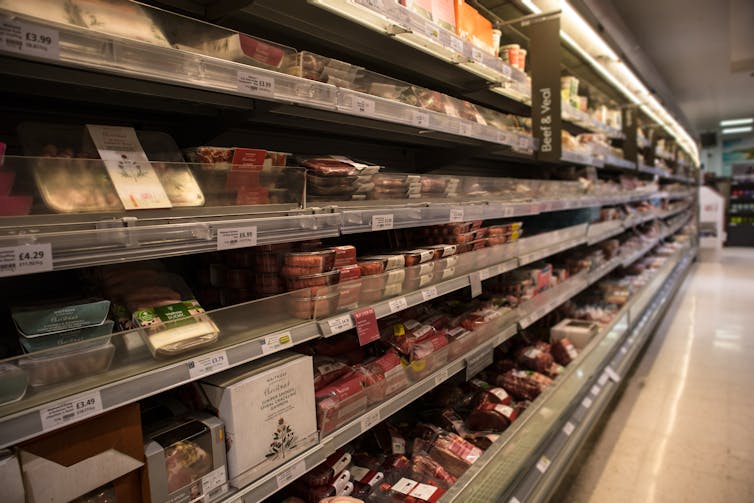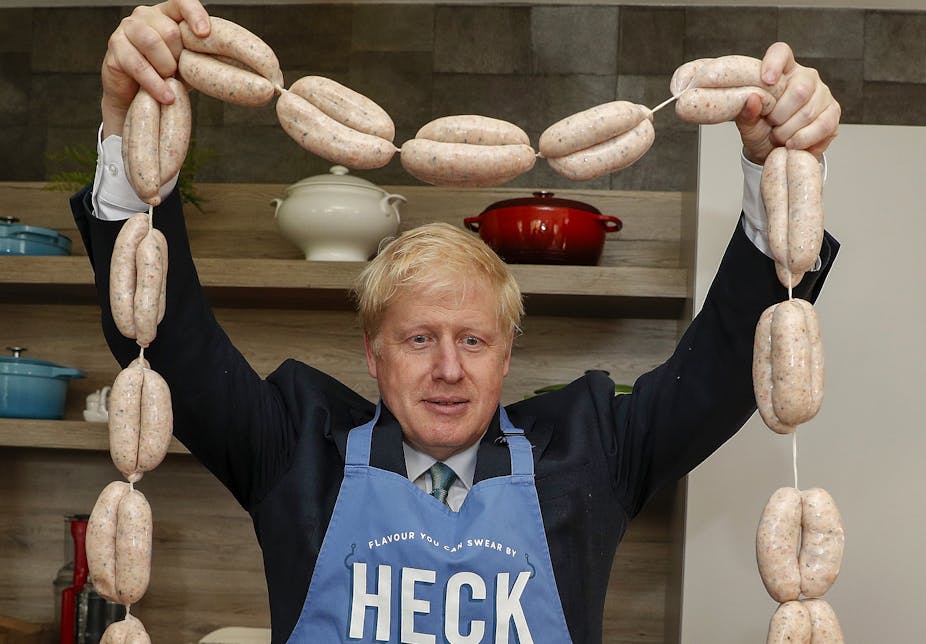In November 2020, Boris Johnson declared that nothing could stop “the Great British sausage from making it to Belfast”. This was in response to reports that the Protocol on Ireland-Northern Ireland, the agreement governing the trading relationship between Northern Ireland and the EU, would effectively ban sausages from being imported to Northern Ireland from the rest of the UK. Now, talks on how to solve this dispute are making little progress ahead of a key deadline, stoking fears of a “sausage war”.
To understand why trade in sausages could be affected, one must first understand the rationale of the Protocol. When the UK decided to leave the EU customs union and internal market, it also accepted a return to border checks on goods traded between the UK and the EU. These checks are required, for example, to collect customs duties (taxes on imports) and to ensure that goods comply with domestic rules.
The return of border checks on traded goods presented a particular problem for Northern Ireland. The 1998 Belfast Agreement – the international treaty underpinning the peace process in Northern Ireland – was framed by both the EU and the the UK as requiring that there should not be a return to a hard border within the island of Ireland. To avoid such a border after Brexit, Northern Ireland needs to comply with EU customs and internal market law.
There is therefore no need to carry out regulatory compliance checks on goods traded between Northern Ireland and the Republic of Ireland, as they comply with the same rules. By contrast, goods imported into Northern Ireland from outside of the EU, (including, now, Great Britain), are subject to a number of formalities, procedures and checks. For imports from the rest of the UK, these checks occur at the Irish Sea customs border.
But what about the sausages?
EU food safety regulations allow only frozen meats to enter the single market – prohibiting the import of chilled meat products, such as sausages and minced meat. Such a ban does not apply to meat products traded within the EU, since all member states are subject to common regulatory standards which are continuously monitored and enforced by EU institutions, as well as domestic and EU courts. However, this does not apply to third countries. The reason for this is that even if a third country adopts rules that are identical to those of the EU (e.g., the UK), the EU cannot simply assume that these rules are effectively complied with and enforced to the EU’s standards.
These restrictions therefore apply to trade between Great Britain and Northern Ireland. And since Northern Ireland is subject to EU laws in this area, the same prohibitions should apply to chilled meat products imported from Great Britain.
However, in December 2020 the EU and the UK agreed on a grace period, starting on January 1 and ending July 1 2021, during which chilled meat products from the rest of the UK could access the Northern Ireland market subject to certain conditions.
It is therefore partially true to claim, as Boris Johnson did, that nothing could stop the Great British sausage from making it to Belfast – but only on a temporary basis.
Now that the grace period is nearing its end, politicians are, once again, faced with the uncomfortable reality of the choices made in the context of Brexit. Leaving the internal market and recapturing the power to set standards and regulations on goods inevitably means increased barriers on trade with the EU.

What happens now?
Politicians on both sides have floated a number of potential solutions. The EU would like the UK to align itself to its food, plant and animal safety rules. The UK, on the other hand, would prefer both sides to agree to recognise the equivalence of each other’s standards whilst maintaining the ability to deviate.
As things stand, chilled meat products from the rest of the UK would be barred from accessing the Northern Ireland market from July 2021 onwards. The UK has offered to unilaterally extend the grace period – but an extension would clearly be in breach of the legally-binding commitments the UK has made under the Protocol.
The EU could react by taking legal action at the European Court of Justice. Should the UK be found to be acting illegally, the UK could find itself at the end of significant financial sanctions which could take the form of a lump sum or penalty payments.
And if the UK did not then comply within six months, the EU would have the right to retaliate by suspending other post-Brexit trade commitments. In effect, this means that the EU could reimpose barriers to trade, such as tariffs and tariff rate quotas, on UK imports.
In other words, the UK could pay a hefty price for its failure to comply with the Protocol. But, in reality, such price would pale in comparison to the further instability it would cause in Northern Ireland and the potential damage inflicted on the peace process.
What is needed, then, is for solutions to be found in a spirit of honesty and good faith. There must be a recognition that these barriers to trade are not, as some have claimed, “bonkers”, but rather the consequences of the trade relationship that the UK has willingly sought to achieve with the EU in a post-Brexit world. The very existence of grace periods is an acknowledgement that both the UK and the EU understood these consequences from the outset.

